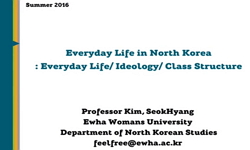Since the division of South and North Korea in 1945, there has been little exchange in science and technology, despite some interchange in a few fields including the chemistry area. Accordingly, the difference in scientific and technological terminolo...
http://chineseinput.net/에서 pinyin(병음)방식으로 중국어를 변환할 수 있습니다.
변환된 중국어를 복사하여 사용하시면 됩니다.
- 中文 을 입력하시려면 zhongwen을 입력하시고 space를누르시면됩니다.
- 北京 을 입력하시려면 beijing을 입력하시고 space를 누르시면 됩니다.
https://www.riss.kr/link?id=A108021226
- 저자
- 발행기관
- 학술지명
- 권호사항
-
발행연도
2021
-
작성언어
English
- 주제어
-
등재정보
KCI등재
-
자료형태
학술저널
-
수록면
294-315(22쪽)
- 제공처
-
0
상세조회 -
0
다운로드
부가정보
다국어 초록 (Multilingual Abstract)
Since the division of South and North Korea in 1945, there has been little exchange in science and technology, despite some interchange in a few fields including the chemistry area. Accordingly, the difference in scientific and technological terminology between the two Koreas has become intensified. This is because North Korea carried out a campaign to purify the Korean language and blocked the inflow of foreign words. They also tried to convert into their own North Korean terms in many fields. This circumstance in North Korea aggravated the heterogeneity of inter-Korean scientific and technological terms. In particular, the heterogeneity of chemical terminology has worsened due to the different characteristics of the technology donor countries such as the United States and Japan in South Korea, and China and the Soviet Union in North Korea between the two Koreas and the different way of technological development. The purpose of this study is to collect chemical terminology data used in two Koreas and analyze similarities and differences. Through comparative analysis of inter-Korean terminology in the chemical field, it can be possible to recognize how the chemical terms between the two Koreas have changed since the division and the degree of heterogeneity based on different technical systems and language policies. The outcome of this study would present basic data on the unification of chemical terminology in preparation for before and after unification, and contribute to communication and academic exchange between researchers in the inter-Korean scientific and technological fields, including chemistry.
동일학술지(권/호) 다른 논문
-
- Asian Society for Innovation and Policy
- Seo, Il Won
- 2021
- KCI등재
-
- Asian Society for Innovation and Policy
- Ko, Chang-Ryong
- 2021
- KCI등재
-
Analyzing Technological Trends of Smart Factory using Topic Modeling
- Asian Society for Innovation and Policy
- Hussain, Adnan
- 2021
- KCI등재
-
The Evolution of Korea's Basic Acts on Science and Technology and their Characteristics
- Asian Society for Innovation and Policy
- Lee, Changyul
- 2021
- KCI등재





 ScienceON
ScienceON



